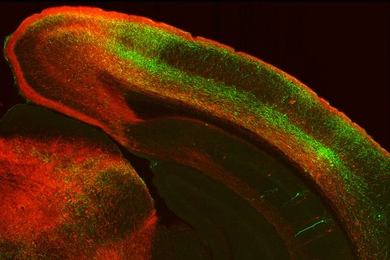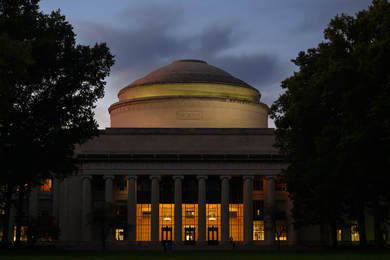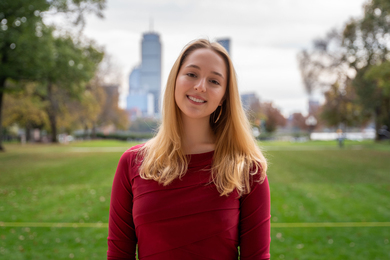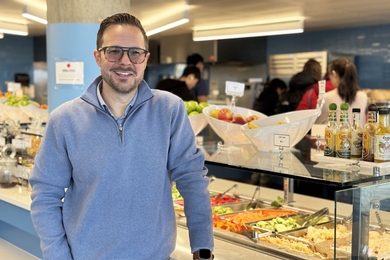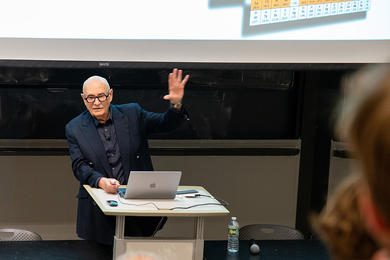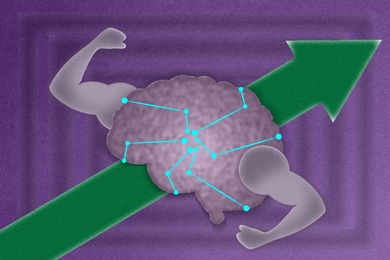Splitting a log to build a 17th century-style storage box may not sound like a typical academic advising session, but for one group of freshmen, this unusual group activity worked very well as a mentoring medium.
"New England Furniture Before the Revolution" is just one of 100 Freshman Advising Seminars (FAS) offered by the Institute as an alternative to traditional freshman advising in which the student meets with a faculty advisor several times each term to talk about course enrollment.
By contrast, freshmen who enroll in an FAS meet weekly with their advisors, sometimes in an offbeat setting, to talk about classes, extracurricular activities and anything else that might be on the freshmen's minds. Often the first minutes of each class are devoted to an informal chat to break the ice and bring out topics that students want to share.
That means an advisor gets to know more than just how a student fared in physics class. Over the course of a term, he or she may learn about the freshmen's friends, family, sports and arts interests, living situation and hopes for the future.
"I expect that the relationship will last," said Professor John Vander Sande, who co-teaches the New England furniture FAS and considers Freshman Advising Seminars to be an important step in building community among faculty, staff and students. "I know these students well, considering they've been here only three months."
WOODWORKING
The furniture class meets in the Hobby Shop, in the basement of Dupont just beneath the gymnasium. Thumps and pounding feet from the basketball game overhead augment the usual shop sounds of woodworking tools and conversation. The class is punctuated by frequent bursts of laughter as the students work on their projects and talk about their days.
One of the freshmen, Karissa Patterson of El Granada, CA, arrives each Tuesday evening at 7pm, coming directly from crew practice at the boathouse. The blisters on her hands from rowing became a topic of conversation and concern for the seminar group, who tend to share in one another's trials and tribulations.
Ms. Patterson cheerfully pointed out the wooden "pintle" hinges she made.
"I had to make three of these, because one of them got so demented," she said, holding out the three wooden pegs, one of which has an odd shape. Two of the pegs will serve as hinges for the lid to her box, made in the same style as the early-American furniture they're copying.
Each student is building a small wooden box about 16 by 8 by 6 inches, smaller but in other respects nearly identical to those used for storage in pre-Revolutionary New England. They're using only hand tools -- no sandpaper, power saws or precut planks -- and nails thatare close reproductions of the hand-forged nails used by early New Englanders.
Starting with a red oak log about 18 inches in diameter, they split the green wood radially with wedges, axe and froe, repeating the process until they got long, narrow wedge-shaped pieces they could flatten with drawknife and hand plane into smooth planks to form the sides and bottoms of the boxes.
"This was a very high-quality log," said Ken Stone, director of the Hobby Shop, who co-teaches the seminar. He said he looked all summer for just the right chunk of tree for building the boxes.
COMMUNITY BUILDING
Professor Vander Sande and Mr. Stone got the idea for the course after Professor Samuel Allen of materials sciences and engineering arranged for the two of them to meet. Professor Allen, the longest-running seminar leader, has taught an FAS for 14 years. He thought that the combination of Professor Vander Sande's interest in colonial furniture and history and Mr. Stone's interest in building furniture could produce an interesting freshmen experience.
Sure enough, that meeting produced a spark and Ken Stone learned over the summer how to build furniture from green wood.
"I have gained a whole new interest in New England history as well as an appreciation of the work and design of its craftsmen," said Mr. Stone.
One fall class outing was a day trip to Newbury, MA to Professor Vander Sande's house, which is filled with pre-Revolutionary New England antiques he and his wife have collected over the years. The house itself is an antique -- the front portion was built in 1697, the back in about 1725.
The trip was a nice break for the students from the daily routine of campus life, and it helped the students, Professor Vander Sande and Mr. Stone get to know each another.
"From being a freshman advisor, I have a much better idea of the life of students," said Mr. Stone. "I know them and they know me much better than we would otherwise."
And that's the community-building aspect of an FAS. Freshmen benefit from close relationships with mentors among faculty and staff, and vice versa.
Faculty members who haven't yet taught a freshmen seminar "are really missing out on a wonderful opportunity to interact with first-term students. It's wonderful to see how they integrate into MIT in all ways, to see what happens to them -- and it's not all positive," said Professor Vander Sande. "I hope the students benefited. As a faculty member, I sure have."
Although he's been teaching at MIT since 1971, he said he learned things this term in his first FAS that he'd never come across before. "Did you know that each class ring contains idiosyncrasies?" he said.
Professor Vander Sande served in the dean of engineering office for seven years, twice as associate dean and twice as acting dean of engineering. "In that job, I did no teaching. I kept my research going, but in time that started eroding." When he left the dean's office, "I was ready to fill my teaching plate as much as made sense," he said.
UNUSUAL SEMINARS
MIT has held freshman advising seminars since 1986. According to Donna Friedman, who directs the program out of the Academic Resource Center, the goals are to improve the quality of advising for first-year students and to provide faculty/freshman interaction at the very start of a student's college career, as well as a learning environment different in size, style and pace from the freshman science core curriculum.
Some examples of the 100 seminars offered this year are "Physical Metallurgy," taught by Professor Allen; "Build a Rocket Deployed Rover," by Dr. Jim Bales of electrical engineering and computer science (EECS); "Discovering Boston's Museums," by Professor Arthur Smith of EECS; and "Bad Plays," by Professor Jeffrey Ravel of the history section.
The seminars are small, with no more than eight freshman and one or two sophomores serving as associate advisors to offer their own take on the freshman year at MIT -- what to avoid, what to seek out.
Most freshmen take a math, physics, chemistry or biology, and humanities course in addition to the freshman seminar, for which they earn six units of credit.
"We try to get them involved in a relatively deep way that gives them a break and distraction from the other 48 units of much more vigorous courses," said Professor Vander Sande. "If they come to class with the same attitude they would take to a physics course, then we're not doing our job."
"It's so different from the other freshmen courses," said Mallory Briggs, a freshman from Shelbourne, VT. "This is a really nice change."
Asked why she chose to stick with the seminar despite her already very full schedule of coursework, skiing and lacrosse, she answered firmly, "I'm gonna have a box and I'm gonna be able to say I made it from a log."
Said her classmate, Will Arora, a freshman from Lake Forest, IL who is also on the crew team, "I enjoy working with other students in a small class because you make friends with them quickly and look forward to meeting them again in class every week."
Associate advisor Jenny Lin, a sophomore in biology, took traditional advising when she was a freshman. "I highly recommend the freshman seminars," she said. "The interaction with professors on that level is really intimate."
About 75 percent of freshmen now choose seminars over traditional advising, a choice they make in the summer before school starts.
Most faculty who try it once continue to teach the seminars, in spite of the demanding schedule of an MIT faculty member.
"It's a remarkable professional growth experience," said Professor Vander Sande. "At MIT, the external rewards for doing an FAS are pretty minimal. As Joel Moses said, 'we live in a no-praise zone.' But going home at night and feeling that you've done a good job is reward enough."
A version of this article appeared in MIT Tech Talk on December 15, 1999.

